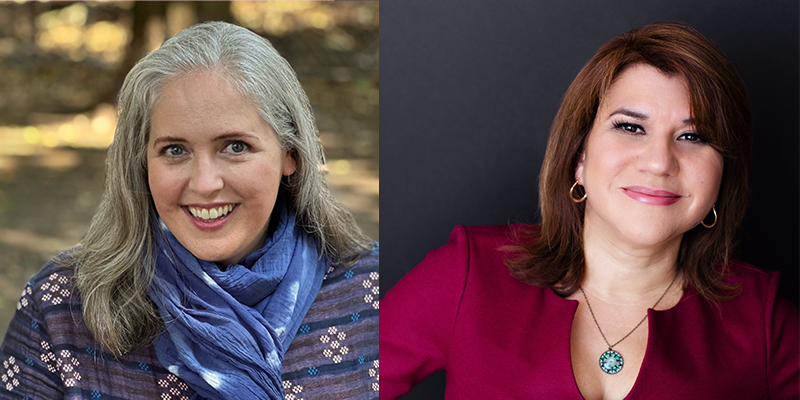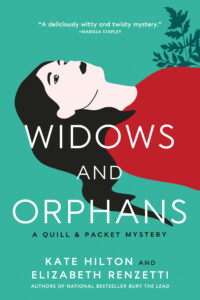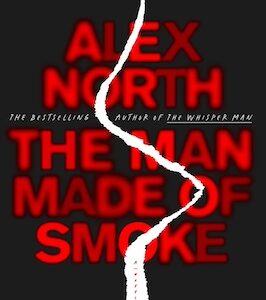Kate Hilton, a practicing psychotherapist, and Elizabeth Renzetti, a career journalist, are the authors of the Quill & Packet mystery series. The first book, Bury the Lead, became a bestseller in Canada when it was published in early 2024. On May 1, Widows and Orphans continues the adventures of Cat Conway, a journalist for a cottage-country newspaper, as she investigates the murder of a wellness influencer and dodges attacks by misinformation-sowing locals.
On the eve of publication, the authors sat down for a conversation about their writing collaboration.
KH: It’s so great to be at a point where we’re launching the second book in the Quill & Packet series and writing the third one! It still feels kind of surreal to me.
ER: Especially as the world catches up to our fiction. In an earlier century we might have been burned as witches, because the mystery in Widows and Orphans is so timely: We’ve got the wellness industry, anti-vaccine protests, and a disinformation dumpster fire. As a journalist I’m used to being treated like a witch, though.
KH: I know what you mean. There’s some of that in the therapy room, too. One thing I love about this book is how we’ve captured some of the malign effects of living in an era of massive stress and uncertainty. People want to feel better; they want more control over their lives and more answers. It makes them vulnerable to bad actors selling snake oil – whether that’s in the form of products or “information”.
ER: It’s a confusing world, and people seek comfort and autonomy. The healthcare system can be an impersonal nightmare. Also, the wellness world looks so pretty from the outside. It’s seductive. We have a lot of fun in the book gently poking fun at some of the gauzier and greedier aspects of the wellness complex. You’re very good at the psychological motivations that underpin wellness, and could make someone angry enough to murder.
KH: The rise of the wellness industry is so connected to our human need to make sense of things. I think it’s really hard for people to accept the incredible specialization of knowledge that exists now. We’re asked to put our trust in systems that we don’t have the ability to understand fully, and that reality can seed mistrust, even paranoia. Wellness influencers and populist politicians both play on this basic insecurity.
ER: And we do have a dodgy politician in our cast of suspects! Along with Cat’s eternally disappointed mother Marian, who’s a cross between Hillary Clinton and Arianna Huffington. It was fun writing a mother-daughter relationship that felt real, and prickly. It’s rich territory, isn’t it?
KH: Is it ever! There’s an expression in therapy: Your family knows how to push your buttons so effectively because they installed them. I like the complexity of Cat’s feelings about Marian, and how Marian’s judgments about her daughter’s life choices knock around in Cat’s head. Cat’s a great journalist, but being a staff reporter at the Quill & Packet isn’t an easy gig – and not only because Cat keeps tripping over dead bodies! Marian thinks Cat could do better, and sometimes Cat thinks that, too.
ER: Most people don’t know that we initially tried to write Cat as someone in her late twenties. She only came to life when we wrote her as a middle-aged woman with middle-aged problems – divorce, hostile teenager, career upheaval. In the first book, she’s incredibly disappointed that she got fired from her hotshot journalism job and has to work at a small newspaper in the sticks.
KH: You have a real love of small town newspapers. You collect them whenever we’re out on the road.
ER: I love small papers, everything from the ads for tractors to news about sewage system upgrades. We hear a lot of doom and gloom about the demise of small news outlets, but in many towns they’re thriving, and doing incredibly important work on the environment, politics and – yes, as Cat does in the book – vaccine denial. We’ve met a few real-life Cat Conways as they interviewed us on our first book tour. They’re superwomen in running shoes instead of capes. But I have to say, writing fiction with you is much more fun than chasing the news.
KH: We’ve been so incredibly lucky in our partnership. Honestly, it’s the most fun I’ve ever had at work. I feel like we’ve hacked the writing business – all of the joy and none of the loneliness and self-doubt. Although I feel that statement should come with a caveat: Choose your partner very carefully.
ER: Maybe that’s the secret to a happy marriage – communicate entirely in Google docs!
KH: One of the most common things we get asked is how we manage the logistics of writing together. I always say that the outline we come up with at the beginning of the process is the foundation that holds everything up, but lately (writing book three) I’ve been noticing that it also gives us the freedom to experiment a bit. By which I mean that for me, it provides guardrails. I know where I need a particular chapter to go, but I don’t feel that I have to get there in precisely the way we imagined, so long as I don’t drive off the road.
ER: We each have to have complete confidence in the other person’s vision, and ability to “see” through Cat’s eyes, since the series is written in the first person. But we each bring unique strengths to the books. I understand how newsrooms work. You’re a master of plotting and psychological insights.
KH: You’re also the funniest person I know. I routinely laugh out loud when I see your chapter drafts.
ER: Thank you! I’m going to have that printed on my gravestone. We also have some shared weaknesses, around continuity for example.
KH: True. If it were up to us, days would last for weeks in Port Ellis. Thank goodness for editors, who ask excellent questions like, “Shouldn’t it be a new day by now?”
ER: Kindness and honesty are the basis for our partnership. If we were a country, that would be our national motto. It’s funny, but I think our collaboration is reflected in Cat’s relationship with her colleagues at the Quill & Packet. In the first book, she’s not sure where she belongs. In Widows and Orphans, she’s started to fall in love with her found family in the newsroom and in town.
KH: Oh, I love that comparison. Yes, it’s been great writing about that growing trust and affection that Cat has for her colleagues. Since I started writing novels, I’ve been interested in showing characters in the workplace. We see a lot of that world on television, but much less in novels. Yet those relationships can be extraordinarily deep and last longer than many marriages.
ER: I’m looking forward to exploring all those relationships as we continue the Quill & Packet mystery series. For now, readers can journey back to Port Ellis in Widows and Orphans. Happy reading!
***


















